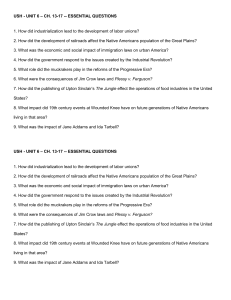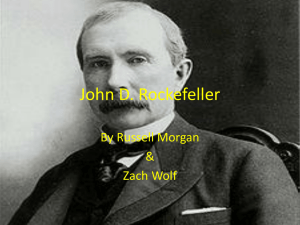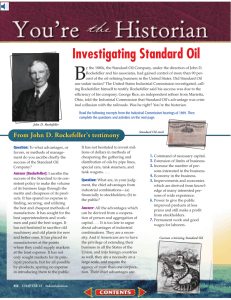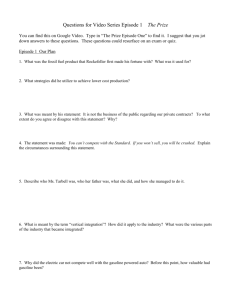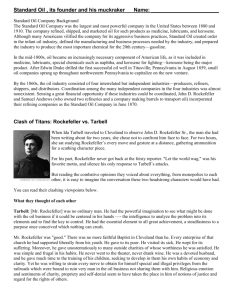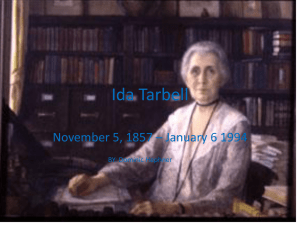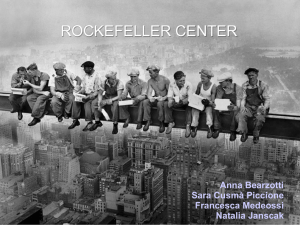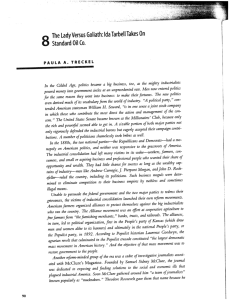Ida Tarbell vs John D Rockefeller's Standard Oil Trust
advertisement
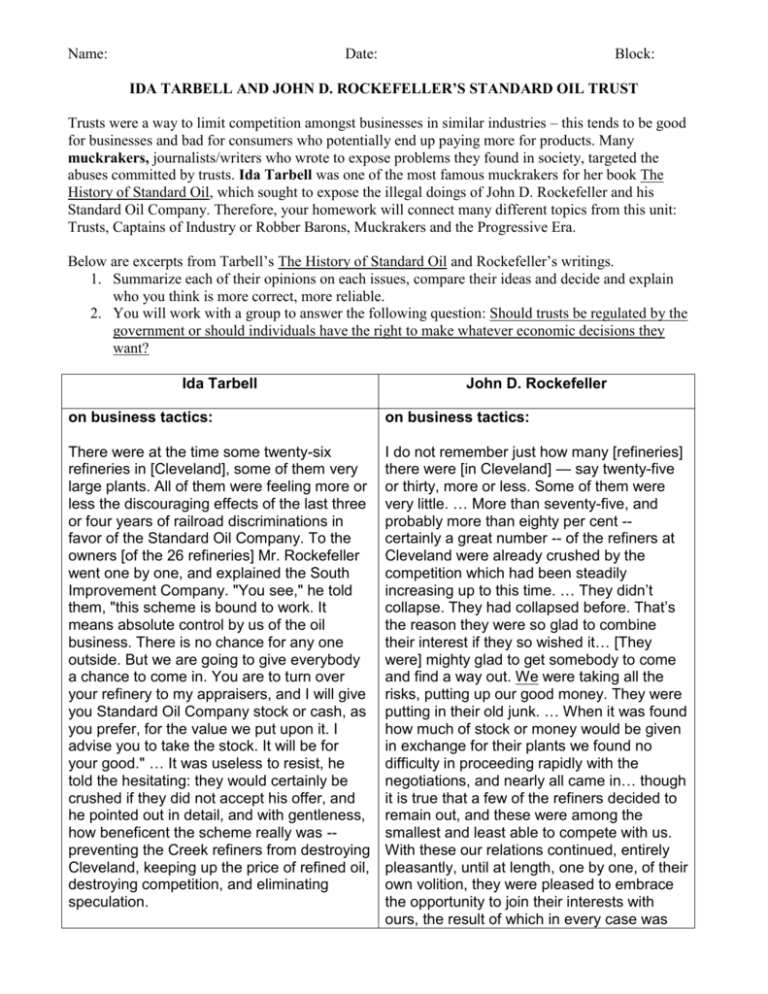
Name: Date: Block: IDA TARBELL AND JOHN D. ROCKEFELLER’S STANDARD OIL TRUST Trusts were a way to limit competition amongst businesses in similar industries – this tends to be good for businesses and bad for consumers who potentially end up paying more for products. Many muckrakers, journalists/writers who wrote to expose problems they found in society, targeted the abuses committed by trusts. Ida Tarbell was one of the most famous muckrakers for her book The History of Standard Oil, which sought to expose the illegal doings of John D. Rockefeller and his Standard Oil Company. Therefore, your homework will connect many different topics from this unit: Trusts, Captains of Industry or Robber Barons, Muckrakers and the Progressive Era. Below are excerpts from Tarbell’s The History of Standard Oil and Rockefeller’s writings. 1. Summarize each of their opinions on each issues, compare their ideas and decide and explain who you think is more correct, more reliable. 2. You will work with a group to answer the following question: Should trusts be regulated by the government or should individuals have the right to make whatever economic decisions they want? Ida Tarbell John D. Rockefeller on business tactics: on business tactics: There were at the time some twenty-six refineries in [Cleveland], some of them very large plants. All of them were feeling more or less the discouraging effects of the last three or four years of railroad discriminations in favor of the Standard Oil Company. To the owners [of the 26 refineries] Mr. Rockefeller went one by one, and explained the South Improvement Company. "You see," he told them, "this scheme is bound to work. It means absolute control by us of the oil business. There is no chance for any one outside. But we are going to give everybody a chance to come in. You are to turn over your refinery to my appraisers, and I will give you Standard Oil Company stock or cash, as you prefer, for the value we put upon it. I advise you to take the stock. It will be for your good." … It was useless to resist, he told the hesitating: they would certainly be crushed if they did not accept his offer, and he pointed out in detail, and with gentleness, how beneficent the scheme really was -preventing the Creek refiners from destroying Cleveland, keeping up the price of refined oil, destroying competition, and eliminating speculation. I do not remember just how many [refineries] there were [in Cleveland] — say twenty-five or thirty, more or less. Some of them were very little. … More than seventy-five, and probably more than eighty per cent -certainly a great number -- of the refiners at Cleveland were already crushed by the competition which had been steadily increasing up to this time. … They didn’t collapse. They had collapsed before. That’s the reason they were so glad to combine their interest if they so wished it… [They were] mighty glad to get somebody to come and find a way out. We were taking all the risks, putting up our good money. They were putting in their old junk. … When it was found how much of stock or money would be given in exchange for their plants we found no difficulty in proceeding rapidly with the negotiations, and nearly all came in… though it is true that a few of the refiners decided to remain out, and these were among the smallest and least able to compete with us. With these our relations continued, entirely pleasantly, until at length, one by one, of their own volition, they were pleased to embrace the opportunity to join their interests with ours, the result of which in every case was Name: Date: Block: most satisfactory to them. What I did say [to them] was: "We here [in Cleveland] are at a disadvantage. Something should be done for our mutual protection. We think this is a good scheme. Think it over. We would be glad to consider it with you if you are so inclined." There was no compulsion, no pressure, no ‘crushing’. How could our company succeed if its members had been forced to join it and were working under the dash? Summarize in your own words: Summarize in your own words: Who do you believe more? Why? Extra Credit/Practice For an extra 3 points on your homework, write an argumentative paragraph (including outside info and evidence from the document) in response to this DBQ prompt: Should trusts be regulated by the government or should individuals have the right to make whatever economic decisions they want? Name: Date: Block: IDA TARBELL AND JOHN D. ROCKEFELLER’S STANDARD OIL TRUST Trusts were a way to limit competition amongst businesses in similar industries – this tends to be good for businesses and bad for consumers who potentially end up paying more for products. Many muckrakers, journalists/writers who wrote to expose problems they found in society, targeted the abuses committed by trusts. Ida Tarbell was one of the most famous muckrakers for her book The History of Standard Oil, which sought to expose the illegal doings of John D. Rockefeller and his Standard Oil Company. Therefore, your homework will connect many different topics from this unit: Trusts, Captains of Industry or Robber Barons, Muckrakers and the Progressive Era. Below are excerpts from Tarbell’s The History of Standard Oil and Rockefeller’s writings. 1. Summarize each of their opinions on each issues, compare their ideas and decide and explain who you think is more correct, more reliable. 2. You will work with a group to answer the following question: Should trusts be regulated by the government or should individuals have the right to make whatever economic decisions they want? Ida Tarbell Standard Oil vs. the independents: John D. Rockefeller Standard Oil vs. the independents: All over the country the refineries in the same condition as Mr. Tack's firm sold or leased. Those who felt the hard times and had any hope of weathering them resisted at first. With many of them the resistance was due simply to their love for their business and their unwillingness to share its control with outsiders. The thing which a man has begun, cared for, led to a healthy life, from which he has begun to gather fruit, which he knows he can make greater and richer, he loves as he does his life. It is one of the fruits of his life. He is jealous of it -- wishes the honor of it, will not divide it with another. He can suffer heavily by his own mistakes, learn from them, correct them. He can fight opposition, bear all -- so long as the work is his. There were refiners in 1875 who loved their business in this way. Why one should love an oil refinery the outsider may not see; but to the man who had begun with one still and had seen it grow by his own energy and intelligence to ten, who now sold 500 barrels a day where he once sold five, the refinery was the dearest spot on earth save his home. He walked with pride among its evil-smelling places, watched the processes with eagerness, experimented with joy and recounted triumphantly every improvement. To ask such a man to give up What a Godsend it was to the many little inefficient and unsuccessful refiners of Oil Creek that a buyer was found for them when for years they had been losing money! How wrong for the "historian" to call it a crime that these men were delivered from their sinking ships. It was a great mercy and without precedent, as has been hitherto stated. Almost any other historian, it would seem, would blush today to read injustice as it is written in these very pages, where [Ms. Tarbell] is made to speak of the crime, which should have been characterized only as an unprecedented magnanimous deliverance such as had not hitherto been known in the annals of business! In all times past the weak man in the competition dropped out and was lost sight of. These men for years were importuned to join hands with those who were stronger and ready to pull them out from their embarrassments and fit them in to be useful in the administration of the Standard Oil Company so far as they had integrity, intelligence, enterprise and industry to warrant the expectation that they could be stones in the foundation of the great structure, the likes of which the world had never seen. Name: Date: his refinery was to ask him to give up the thing which, after his family, meant most in life to him. To Mr. Rockefeller this feeling was a weak sentiment. To place love of independent work above love of profits was as incomprehensible to him as a refusal to accept a rebate because it was wrong! Summarize: Block: [As for the producers], they were like a lot of foolish children, and would not be controlled, and would not observe the law referring to supply and demand. And this was all there was in the problem. How many times we told them--over and over again! --that if they would restrict production they would be the gainers. But how impossible it was for them to grasp that fact, and how impossible it was for them to summon sufficient integrity to carry out they agreements they made, in order to keep it. They knew it, but they wanted what certain of the refiners wanted; that is, to keep their bread and butter and eat it, too. This was found impossible. These people didn’t believe in themselves; they didn’t believe in the Standard Oil Co, they didn’t believe in anybody, away down, and there was a screw loose in a great many of them, and so the sane ones had a hard problem. Summarize: Who do you believe more? Why? Extra Credit/Practice For an extra 3 points on your homework, write an argumentative paragraph (including outside info and evidence from the document) in response to this DBQ prompt: Should trusts be regulated by the government or should individuals have the right to make whatever economic decisions they want? Name: Date: Block: IDA TARBELL AND JOHN D. ROCKEFELLER’S STANDARD OIL TRUST Trusts were a way to limit competition amongst businesses in similar industries – this tends to be good for businesses and bad for consumers who potentially end up paying more for products. Many muckrakers, journalists/writers who wrote to expose problems they found in society, targeted the abuses committed by trusts. Ida Tarbell was one of the most famous muckrakers for her book The History of Standard Oil, which sought to expose the illegal doings of John D. Rockefeller and his Standard Oil Company. Therefore, your homework will connect many different topics from this unit: Trusts, Captains of Industry or Robber Barons, Muckrakers and the Progressive Era. Below are excerpts from Tarbell’s The History of Standard Oil and Rockefeller’s writings. 1. Summarize each of their opinions on each issues, compare their ideas and decide and explain who you think is more correct, more reliable. 2. You will work with a group to answer the following question: Should trusts be regulated by the government or should individuals have the right to make whatever economic decisions they want? Ida Tarbell John D. Rockefeller Rockefeller’s legacy: Rockefeller’s legacy: The Standard Oil Co. has been one of the greatest, if not the greatest, of upbuilders we ever had in this country--or in any country. All of which has inured to the benefit of the towns and cities the country over; not only in our country but the world over. And that is a very pleasant reflection now as I look back. I knew it at the time, though I realize it more keenly now. We had vision, saw the vast possibilities of the oil industry, stood at the center of it, and brought our knowledge and imagination and business experience to bear in a dozen-twenty, thirty directions. There was no branch of the business in which we did not make money. It will be said: "Here was a force that reorganized business, and everything else followed it--all business, even the Government itself, which legislated against it." [John Rockefeller’s] importance lies not so much in the fact that he is the richest individual in the world, with the control of property that entails; it lies in the fact that his wealth, and the power springing from it, appeal to the most universal and powerful passion in this country -- the passion for money. John D. Rockefeller, measured by our national ambition, is the most successful man in the world--the man who has got the most of what men most want. … Mr. Rockefeller is a hypocrite. This man has for forty years lent all the power of his great ability to perpetuating and elaborating a system of illegal and unjust discrimination by common carriers. He has done more than any other person to fasten on this country the most serious interference with free individual development which it suffers, an interference which, today, the whole country is struggling vainly to strike off, which it is doubtful will be cured, so deep-seated and so subtle is it, except by revolutionary methods. It does not pay. Our national life is on every side distinctly poorer, uglier, meaner, for the kind of influence he exercises. Name: Summarize: Date: Block: Summarize: Who do you believe more? Why? Extra Credit/Practice For an extra 3 points on your homework, write an argumentative paragraph (including outside info and evidence from the document) in response to this DBQ prompt: Should trusts be regulated by the government or should individuals have the right to make whatever economic decisions they want?
